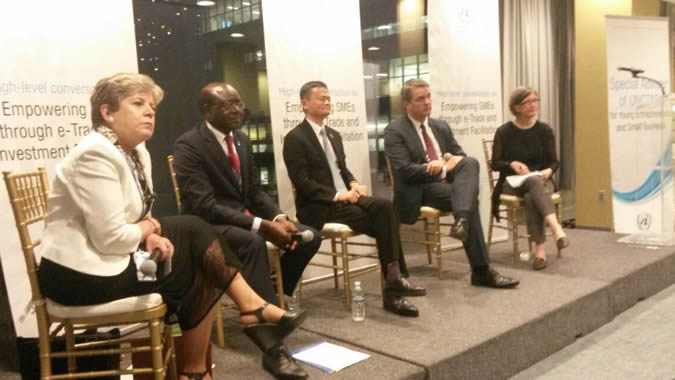Press Release
The Executive Secretary of the Economic Commission for Latin America and the Caribbean (ECLAC), Alicia Bárcena, emphasized today in New York that digitalization is a key tool for increasing the productivity and quality of jobs created by Small and Medium-sized Enterprises (SMEs) and thereby contributing to reducing inequality in the region, since these companies currently account for 61% of employment in Latin America and the Caribbean but only represent 29% of its Gross Domestic Product (GDP).
ECLAC’s most senior representative participated in a high-level conversation on Empowering SMEs through e-Trade and Investment Facilitation, organized by the United Nations Conference on Trade and Development (UNCTAD) and held at UN headquarters on the sidelines of the 71st session of the General Assembly.
The speakers during the dialogue, which was moderated by journalist Sarah Murray, also included Mukhisa Kituyi, Secretary-General of UNCTAD; Jack Ma, Executive Chairman of the Alibaba Group Chinese consortium, who has been named UNCTAD Special Advisor for Youth Entrepreneurship and Small Business; and Roberto Azevêdo, Director General of the World Trade Organization (WTO).
Alicia Bárcena recalled that in Latin America and the Caribbean the income of the wealthiest 10% of the population is 14 times greater than that of the poorest 40% of people. This inequality is closely linked to the productivity gaps that exist between big companies and SMEs, which, among other limitations, face problems in accessing credit to be able to finance the incorporation of new technologies into their production processes.
According to Bárcena, the digitalization of the economy will prompt a paradigm shift this century, similar to what electricity sparked in the 19th century with the Industrial Revolution. For that change to fully come about in Latin America and the Caribbean, the public and private sectors must commit to establishing standards and common regulations and to investing in infrastructure to expand access to broadband connections, she stated.
ECLAC’s Executive Secretary also said that the digitalization of the economy is a tool that must be at the service of reducing inequality gaps and of sustaining the long-term vision set forth in the 2030 Agenda for Sustainable Development, approved in September 2015, whose 17 goals include the promotion of sustainable economic growth and full employment (SDG 8) and the reduction of inequality in and among countries (SDG 10).
As Bárcena stressed, progress on digitalization also facilitates women’s integration in the labor market, promoting gender equality, which is consecrated in the fifth SDG.
To implement the 2030 Agenda in the region, ECLAC proposes a big environmental push through investments in key sectors that help reactivate growth, create quality jobs and combat the effects of climate change, Alicia Bárcena explained. “Latin America and the Caribbean must also leave behind the culture of extraction, based on exploitation of natural resources, to move towards a culture of sustainability,” the Executive Secretary said.



